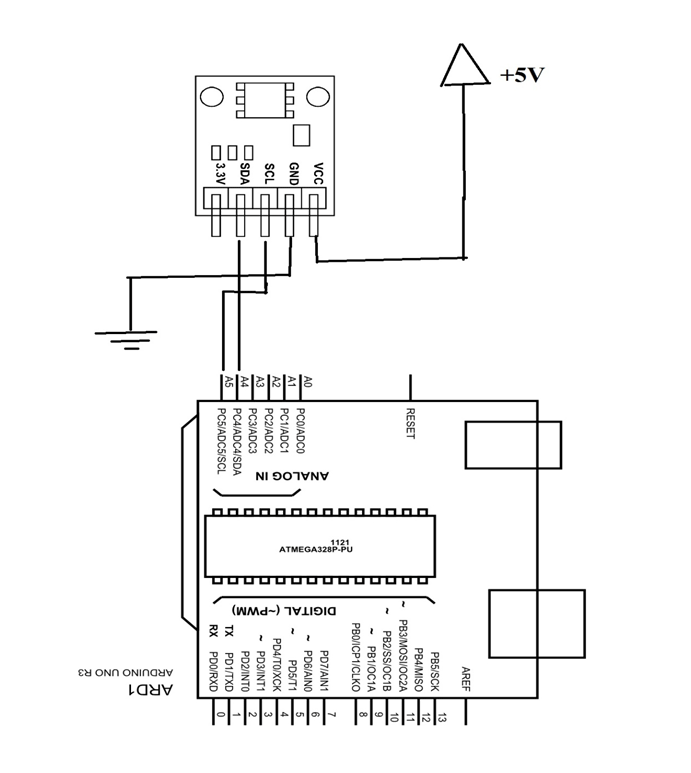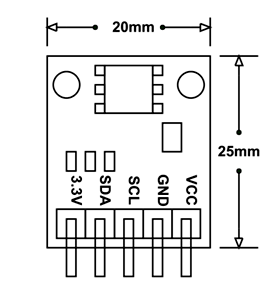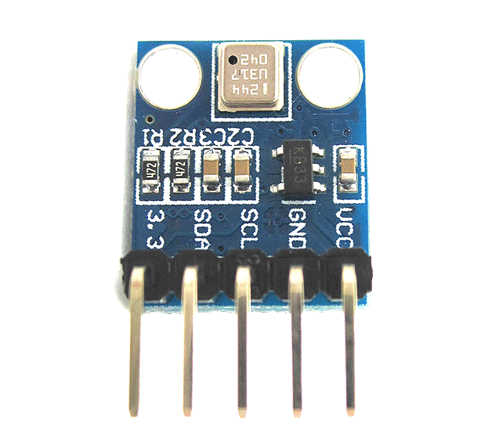BMP180 - Atmospheric Pressure Sensor
BMP180 is one of sensor of BMP XXX series. They are all designed to measure Barometric Pressure or Atmospheric pressure. BMP180 is a high precision sensor designed for consumer applications. Barometric Pressure is nothing but weight of air applied on everything. The air has weight and wherever there is air its pressure is felt. BMP180 sensor senses that pressure and provides that information in digital output. Also the temperature affects the pressure and so we need temperature compensated pressure reading. To compensate, the BM180 also has good temperature sensor.
BMP180 Pin Configuration
BMP180 is available in two modules. One is Five pin module and other is Four pin module. With Five pin module we have additional +3.3V pin which is absent in four pin module. Other than that the functioning is same.
|
Pin Name |
Description |
|
VCC |
Connected to +5V |
|
GND |
Connected to ground. |
|
SDA |
Serial Data pin (I2C interface) |
|
SCL |
Serial Clock pin (I2C interface) |
|
3.3V |
If +5V is not present. Can power module by connecting +3.3V to this pin. |
BMP180 MODULE Features
- Can measure temperature and altitude.
- Pressure range: 300 to 1100hPa
- High relative accuracy of ±0.12hPa
- Can work on low voltages
- 3.4Mhz I2C interface
- Low power consumption (3uA)
- Pressure conversion time: 5msec
- Potable size
BMP180 MODULE Specifications
- Operating voltage of BMP180: 1.3V – 3.6V
- Input voltage of BMP180MODULE: 3.3V to 5.5V
- Peak current : 1000uA
- Consumes 0.1uA standby
- Maximum voltage at SDA , SCL : VCC + 0.3V
- Operating temperature: -40ºC to +80ºC
Note: Complete technical information can be found in the BMP180 Datasheet linked at the bottom of this page.
BMP180 Equivalents
Where to Use BMP180 MODULE
There are many reasons why BMP180 is preferred over other modules, here are a few reasons
Case1: Where you want accurate atmospheric pressure. Over many modules present in market, BMP180 measures barometric pressure more accurately.
Case2: Where power consumption is issue. BMP180 MODULE consumes very less power to function. So this module can be used on systems which work on battery like smart watches and mobile phones.
Case3: Where high speed communication is of need. BMP180 MODULE capable of communicating with high speed TWI interface.
With altitude measure, high speed sense and temperature sensor on board the use of BMP180 module is promoted even further than other modules.
How to Use BMP180 MODULE
As seen in PIN DIAGRAM. There are only two pins present to communicate with the module. And this communication is I2C interface. The data is sent to the module or received from the module though I2C interface. So we have to get the information of barometric pressure and temperature through this interface. A typical circuit diagram of BMP180 with ARDUINO is shown below.

As shown in circuit diagram the module is connected to +5V power supply or to ARDUINO UNO Vout pin. The module can work on +5V regulated power and higher voltage may damage the module. The I2C interface is established as shown in figure. All you need to do is connect SDA PIN of module to SDA PIN of ARDUINO and SCL PIN of module to SCL of ARDUINO.
Although connecting to BMP180 sensor module is easy communicating with it is not easy. The data exchange between controller of ARDUINO and module is really complex. Usually to send information to module or receive the information from it we have to follow the protocol. This protocol is sequence of steps to be followed without an error. These steps are complex to follow for starters. So using libraries which are pre written for the module is ideal. Using libraries makes the communication easy. All you need to do is download these libraries and call them in programs. Once the header file is included, the ARDUINO follows the protocol automatically and decodes the required data. Once this data is available we can perform functions of desire.
Hence by using libraries we can use BMP180 module easily.
Applications
- Indoor navigation
- Sport devices
- Computer Peripherals
- GPS
- Weather forecast
- Vertical velocity Indication
- Hobby projects
2D-Model
Measurements in millimeter















